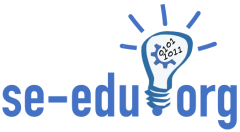The traditional teaching of SE concepts is now gone!! Several teaching tools, methodologies, and techniques have been used and experimented with to bring SE concepts into reality for Millennials. We have been involved in teaching SE courses for Millennials and found that teaching the Requirements Engineering and Software Testing concepts with lecture-based learning is typically difficult and poses many challenges (due to the multiple learning dimensions). The visualization and effectiveness of the tools and techniques defined in the textbooks are trivial for Millennials. Hence, we thought of developing cases (i.e., real-world examples that are open-ended) that can be used to complement lecture-based learning. SEABED (Software Engineering – Case-Based Learning Database) is an initiative toward developing cases meant to boost the teaching/learning of different phases of a typical SE process. This database, in its early stage, is publicly available where anyone can contribute new cases and reuse existing cases for their SE courses.
For experimenting with Case-Based Learning (CBL) in SE education, we developed cases for software requirements, design, and testing; and also evaluated the effectiveness of CBL in the classroom sessions. In SEEM 2018, we got the opportunity to present our work on “Teaching Requirements Engineering Concepts using CBL” to the researchers and academics in SE education. In this work, we reported the results of the study conducted to assess the effectiveness of the Case-Based Learning (CBL) methodology in facilitating the learning of several RE concepts. The study was conducted with students in the 20-22 years age group. The outcome of the CBL exercise was positive, and we found that our learning objectives were achieved. Based on our experiences with CBL sessions, we also stated various related challenges, recommendations, and lessons learned. We particularly want to dedicate this work to our friend, collaborator, mentor (and a Co-Founder of SEABED), and a lovely human being Late Dr Ashish Sureka (Author 4 of our paper).
We would like to thank Hakan and Cécile for the opportunity and also SEEM program committee for their rigorous comments/suggestions to improve our presented paper and also insights to move our research forward in this (related to CBL, empirical study design and interpretation of findings). We would also like to highlight that the way presentations and activity sessions were managed during the workshop was very interesting. Specifically, the brainstorming and collaborative activities carried out during the half-day session is a memorable experience and a new way of discussing SE education challenges for me.
